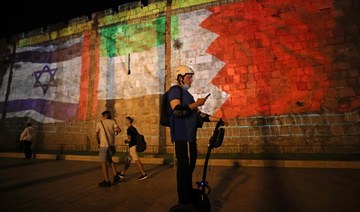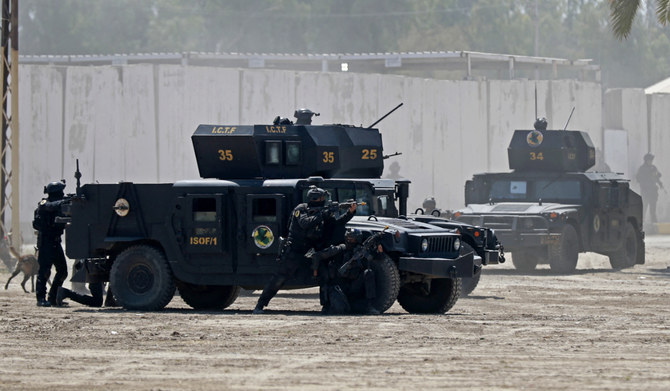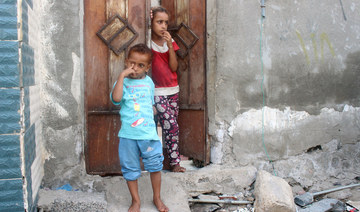DUBAI, United Arab Emirates: Bahrain said Monday it broke up a plot by militants backed by Iran earlier this year to launch attacks on diplomats and foreigners in the island nation home to the US Navy’s 5th Fleet.
The announcement came hours after Saudi state television and a Bahraini local newspaper implied the plot was new in their reporting Sunday night, just days after the island kingdom normalized relations with Israel. Bahraini government officials, who routinely claim breaking up plots by militants backed by Iran, did not respond to requests for comment from The Associated Press over the confusion.
The details of the plot became public as tensions between Iran and the US remain high after the Trump administration claimed to have re-invoked all United Nations sanctions on Tehran over its nuclear program — something disputed by other world powers. The militants reportedly sought revenge for the US drone strike that killed Iranian Gen. Qassem Soleimani in January, something long threatened by his colleagues in Iran’s paramilitary Revolutionary Guard.
Iran’s mission to the UN dismissed Bahrain’s claim of Tehran being involved as just “another instance in a long line of preposterous and false allegations, with no basis in truth.”
“It appears there is no limit to Iran-bashing by the US and its client states in the region, who are trying to divert attention from their recent betrayal to Palestinians and their own people,” mission spokesman Alireza Miryousefi told the AP.
The Saudi state TV report aired previously unseen footage of what appeared to be police raiding a home with a hidden passage. The footage showed assault rifles and explosives, apparently seized in the raid.
Nine militants have been arrested, while another nine are believed to be in Iran, the Saudi state TV report said.
Authorities uncovered the plot after finding an explosive on the street believed to have been planted to target a “foreign delegation,” the pro-government Bahraini newspaper Akhbar Al-Khaleej reported, citing the Interior Ministry. The ministry accused the Guard of supporting the militants, who also had surveilled oil sites and military bases, the newspaper said. The militants also planned on assassinating bodyguards of Bahraini officials, the newspaper said.
It wasn’t clear when all the arrests and alleged plots took place, as the Akhbar Al-Khaleej report referred to incidents dating as far back as 2017. The newspaper linked the militants to the Al-Ashtar Brigade, a Shiite group that has claimed responsibility for a number of bombings and attacks in Bahrain, including two that killed police. The group has been sanctioned by the US
Bahrain’s Interior Ministry later published what it described as a “clarification” saying the cases dated to the start of the year and “is not new.” However, media is tightly controlled on the island and access to such trials is routinely limited, suggesting authorities at the least encouraged the initial reporting.
Bahrain is home to the 5th Fleet, which patrols the waterways of the Mideast. Officials have worried in the past that the sailors and Marines attached to the base in Manama could be targeted, as well as others who make up the 7,000 American troops there. Cmdr. Rebecca Rebarich, a spokeswoman for the 5th Fleet, declined to comment and referred questions to the Bahraini government.
Bahrain, an island off the coast of Saudi Arabia, just last week normalized relations with Israel alongside the United Arab Emirates, in part over their joint suspicion of Iran. The UAE has said their move also pushed Israel to halt its contentious plan to annex occupied West Bank land sought by the Palestinians. Civil society groups in Bahrain have opposed the normalization decision.
Israel’s Foreign Ministry declined to comment on the reported arrests in Bahrain.
Iran under Shah Mohammad Reza Pahlavi had pushed to take over Bahrain after the British left the country, although Bahrainis in 1970 overwhelmingly supported becoming an independent nation and the UN Security Council unanimously backed that. Since Iran’s 1979 Islamic Revolution, Bahrain’s rulers have blamed Iran for arming militants on the island. Iran denies the accusations.
Bahrain says it broke up militant attack plot in early 2020
https://arab.news/mkmvj
Bahrain says it broke up militant attack plot in early 2020
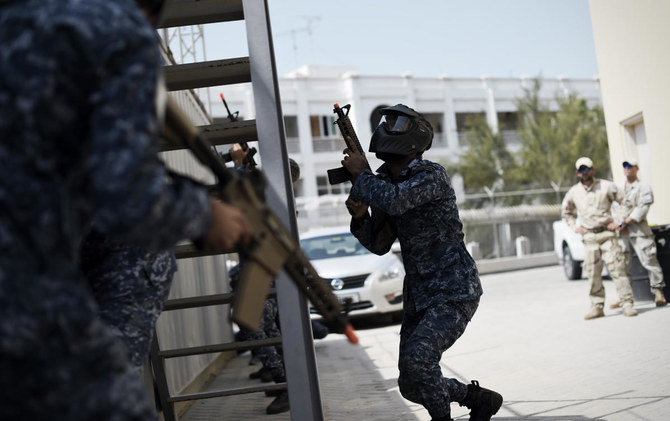
- The plot targeting diplomats and foreign nationals was foiled earlier in the year
- Authorities uncovered the plot after finding an explosive on the street believed to have been planted to target a ‘foreign delegation’
Leaders of Jordan and Pakistan call UAE president to express concern about effects of severe storm

- Leaders passed on their best wishes to the country as it recovers from the storms
DUBAI: The president of the UAE, Sheikh Mohammed bin Zayed Al-Nahyan, received telephone calls from King Abdullah of Jordan and Pakistan’s Prime Minister Shehbaz Sharif on Friday, during which they expressed concern about the effects of the severe weather, including unusually heavy rainfall, that battered parts of the country this week.
They also passed on their best wishes to the country as it recovers from the storms and “conveyed their heartfelt hopes for the safety and prosperity of the UAE and its people, praying for their protection from any harm,” the Emirates News Agency reported.
Sheikh Mohammed thanked both leaders for their warm sentiments, and emphasized the strong bonds between the UAE and their nations.
The UAE and neighboring Oman were hit by unprecedented rainfall and flooding on Tuesday, with more than 250 millimeters of rain falling in parts of the Emirates, considerably more than is normally seen in a year. Dubai International Airport was forced to close temporarily when runways were flooded.
Peshmerga fighter dies in Turkish strike in north Iraq

JEDDAH: A member of the Kurdish Peshmerga security forces was killed on Friday in a Turkish drone strike in the autonomous Kurdistan region of northern Iraq.
Ankara regularly carries out ground and air operations in the region against positions of the outlawed PKK, the Kurdish separatist group that has waged a decades-long insurgency against the Turkish state.
The victim of Friday’s attack died in a drone strike on his vehicle, said Ihsan Chalabi, mayor of the mountainous Sidakan district near Iraq’s borders with Turkiye and Iran.
For decades, Turkiye has operated several dozen military bases in northern Iraq in its war against the PKK, which Ankara and its Western allies consider a terrorist group.
Both Baghdad and the Kurdish regional government have been accused of tolerating Turkiye’s military activities to preserve their close economic ties.
At the beginning of April, a man described as “high-ranking military official” from the PKK was killed in a Turkish drone strike on a car in the mountainous Sinjar region, according to the Kurdistan counterterrorism services.
Turkish President Recep Tayyip Erdogan is expected to visit Baghdad on Monday on his first official visit to Iraq since 2011.
Iraq’s Defense Minister Thabet Al-Abassi in March ruled out joint military operations against the PKK, but said that Turkiye and Iraq would “work to set up a joint intelligence coordination center.”
Middle East in ‘shadow of uncertainty due to regional conflicts’

WASHINGTON: Economies in the Middle East and North Africa face a “shadow of uncertainty” from ongoing tensions in the region, a senior IMF official said.
“We are in a context where the overall outlook is cast into shadows,” Jihad Azour, the International Monetary Fund’s director for the Middle East and Central Asia department, said in an interview in Washington.
“The shadow of uncertainty on the geopolitical side is an important one,” added Azour, a recent candidate for the next Lebanese president.
In the face of the ongoing conflicts in Gaza and Sudan and a recent cut to oil supplies by Gulf countries, the IMF has pared back its growth outlook for the Middle East and North Africa region once again.
FASTFACT
Economic activity in Gaza has ‘come to a standstill’ and the IMF estimates that economic output in the West Bank and Gaza contracted by six percent last year.
The IMF expects growth in MENA of 2.7 percent this year — 0.2 percentage points below its January forecast — before picking up again next year, the IMF said in its regional economic outlook report.
The risks to growth in the MENA region remain heightened, the IMF said, pointing to the danger of greater regional spillovers from the ongoing Israel-Gaza war.
“We have concerns about the immediate and lasting impact of conflict,” Azour said.
The IMF report said that economic activity in Gaza has “come to a standstill” and estimates that economic output in the West Bank and Gaza contracted by 6 percent last year.
The IMF said the report excludes economic projections for the West Bank and Gaza for the next five years “on account of the unusually high degree of uncertainty.”
The IMF cannot lend to the West Bank and Gaza because they are not IMF member countries.
However, Azour said it has provided the Palestinian Authority and the central bank with technical assistance during the current conflict.
“When we move into the reconstruction phase, we will be part of the international community support to the region,” he added.
Azour also discussed the situation in Sudan, where thousands have been killed in a civil war that has also devastated the economy, causing it to contract by almost 20 percent last year, according to the IMF.
“The country is barely functioning, institutions have been dismantled,” he said.
“And for an economy, for a country like Sudan, with all this potential, it’s important to stop the bleeding very quickly and move to a phase of reconstruction,” he added.
The recent Houthi attacks have particularly badly hit the Egyptian economy on Red Sea shipping, which caused trade through the Egypt-run Suez Canal to more than halve — depriving the country of a key source of foreign exchange.
Egypt reached an agreement last month to increase an existing IMF loan package from $3 billion to $8 billion after its central bank hiked interest rates and allowed the pound to plunge by nearly 40 percent.
A key pillar of the current IMF program is the privatization of Egypt’s state-owned enterprises, many of which are owned by or linked to the military.
“This is a priority for Egypt,” Azour said. Egypt needs to have a growing private sector and give space for the private sector to create more jobs.”
“We have an opportunity to re-engineer the state’s role, to give the state more responsibility as an enabler and less as a competitor,” he said.
Oxfam director urges global support for refugees in Jordan
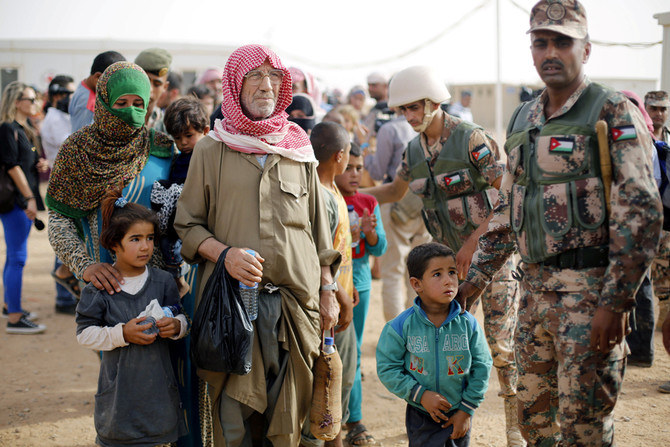
- Dmitry Medlev speaks of impact of over 3m people from neighboring areas
LONDON: Oxfam’s country director in Jordan said on Friday the global community had a responsibility to support refugees, especially in light of unrest in the Middle East.
In an interview with the Jordan News Agency, Dmitry Medlev described how an influx of over 3 million refugees from neighboring areas had stretched Jordan’s economic resources, disrupted local communities, and burdened public services.
He described the refugee’s experience as harrowing, often involving the painful process of abandoning the individual’s homeland and everything they held dear.
He said: “We are sending a message to the world not to overlook the refugee problem and to keep its focus on the new global disasters created by humans or caused by natural disasters, and the conflicts that have emerged in several countries recently, because the refugee problem is draining host countries and imposing additional burdens on them that they may not be able to bear in the future.”
Medlev called for enhanced international cooperation and adherence to international humanitarian law in supporting refugees, underscoring the need for long-term solutions to the ongoing crisis.
He also spoke of Oxfam’s initiatives in Jordan, such as the Waste to Positive Energy project in partnership with the Federal Ministry of Economic Cooperation and Development, and the EU, and executed with the German Corporation for International Cooperation. The project focuses on waste management and recycling in Zaatari Camp and Mafraq Governorate, processing about 30 tonnes of waste per day.
Medlev also pointed out Oxfam’s efforts in promoting economic and climate justice through grants aimed at empowering local projects led by women and youngsters. These grants help enhance project efficiency, ensure sustainability, and connect beneficiaries with supportive institutions.
He outlined Oxfam’s five-year strategy in Jordan, which focuses on gender justice, climate justice, and economic justice, and aims to bolster the country’s preparedness for disasters, enhance employment opportunities, and provide humanitarian support for refugees.
Jordan’s King Abdullah II told the UN General Assembly in September that the world must not abandon Palestinian refugees to the forces of despair.



